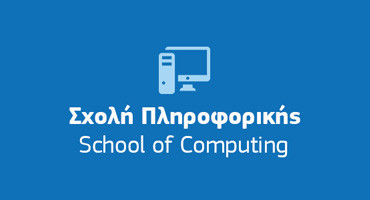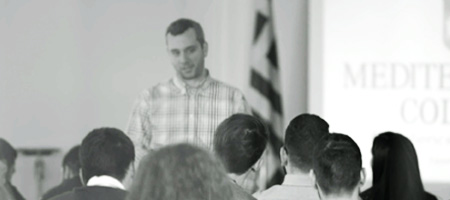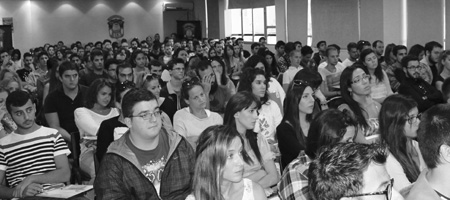





BSc (Hons) Computer Games Programming
-
Ranked 1st Greece | TOP 20 in the UK.
-
Combination of Computer Science and Games Development.
-
High Performance Computing Labs.
-
Networking opportunities with the Gaming Industry.

Course Information
The Mediterranean College Computing School has a 30+ year experience and offers a variety of updated programmes, designed in consultation with IT industry leaders, to provide the most current knowledge in Computer Science and Networks. The BSc (Hons) Computer Games Programming course has been designed by the University of Derby, a TOP20 UK University in Game Design studies, according to the Guardian University Guide 2023 and holds an outstanding reputation within the UK gaming industry.
It is based on the theoretical background of Computer Science, that underpins all software development. Knowledge of Computer Science is a prerequisite for a successful career in programming and is essential for the development of specialized software, including the breadth and complexity of Computer Games.
In the first year, students learn basic programming and computer science topics while starting their first projects in Unity3D and Unreal Engine, while also learning about graphic engines. In the second year, students deepen their understanding of C++, Open GL, and DirectX while continuing to work on individual and group projects in Unity3D and Unreal. In the third year, students learn about artificial intelligence, work with VR Masks in virtual reality environments, and develop a Game Development project, in which they develop a game from the initial stages of design and lore creation to final testing and the potential for publication.
What you will study
Whether your goal is to develop entertainment video games or serious games (for learning and communication), our programme will take you to the next level with your career plans. To become a successful Games Developer, you need to have a deep understanding of Computer Science, the science upon which programming and software development are based.
We emphasize on the latest game development technologies and graphic applications, such as OpenGL, DirectX, Unity, and Unreal Engine, and covers all modern programming tools, such as C/C++, C#, Java, and Python. It is particularly important that you will learn programming in depth, regardless of languages and tools, understanding how to develop and implement algorithmic solutions to specific computational problems. Special emphasis is placed on emerging technologies, such as virtual reality (VR) and augmented reality (AR), as well as creating multiple games, so that practical experience is gained.
In the final year, you will be able to develop your own complete game while also having sufficient programming knowledge in areas such as web development, databases, and application development.
Why choose this course
- The degree is awarded by the University of Derby, a TOP ranked UK university (TOP20 in Animation & Game Design, Guardian University Guide, 2023).
- We have strong connections with the Greek Games Industry and co-organize the leading Technology Exhibition, Digital Expo.
- It has a Computer Science rather that an Arts & Design orientation, which secures long-term employability as a computer programmer of any kind.
- It is an “industry-standard” programme that combines game development tools (Unity, Unreal), programming languages (C/C++, C#, Java, Python, PHP and specialized Graphics courses (OpenGL, DirectX).
- You practice in modern Computer Labs and High-Performance Computing Labs for real-time graphics applications and game development.
- You develop real business application projects and you create your own, complete computer game.
- In year 2, you may change pathway: Computer Science or Cyber Security.
- You become a bilingual IT professional with excellent academic and professional prospects.
The programme is conducted through a mixture of lectures – some of which are delivered by guest professors, laboratories, tutorials, and rich e-learning materials. Emphasis is placed on the development of practical programming skills, through the use of cutting-edge software development tools in our “industry-standard” labs. Assessment is mainly based on individual assignments, while there are also group projects, presentations, and online tests. The Games Programming program includes numerous projects in which parts or complete games are designed and implemented. In the final year’s dissertation project, you will develop a game using a range of platforms and different technologies.
Courses
Year 1
Foundation of Computer and IT Systems
The module introduces the concepts, terminology, sub-fields, and history of computer science, whilst encouraging students to develop academic skills in reading, writing, research, and presentation. Module content includes topics such as: history of computing, theoretical foundations of computing, number systems, introduction to algorithms and data structures, microprocessors, machine/assembly language, computer architecture, operating systems, compilers and interpreters, software, hardware and networks.
Computational Mathematics
The module introduces mathematical concepts and methods which are highly applicable to computing, such as: set theory, Boolean algebra, logic, differential and integral calculus, linear algebra, graph theory, numerical analysis and iterative methods.
Programming
The module introduces the fundamental principles, concepts, and practice of computer programming, and develops the skills needed to design, implement, and test simple computer programmes. No prior computer programming experience is assumed, and all practical work is done using the industry-standard C# programming language and the software development environment of Microsoft Visual Studio.
Fundamentals of Network and Security
This module covers two important areas of networks; security and network programming. The first part of the module will introduce the concepts, theory and practice of information and computer security. The focus will be on security in the context of LAN, WAN and Intra/Internet environments. The second part will build on principles of IP based networks and provide an understanding of the principles of common Internet and Network protocols, such as HTTP, FTP, SNMP, SMTP, etc.
Computer Systems, data structures and data management
The module explores two related, although distinct, foundations of real life computer applications: human-computer interaction and data. Module content includes: product design, user-interface design and usability, data representations, data modelling and data storage. Data types and various techniques for modelling the storage and transfer of data, are implemented using Java / Python programming language.
Games Technologies
Introduction to graphics engines using Unity3d. The course introduces all the concepts of a game engine and its use in the design and implementation of a game. The course also includes scripting code where students learn the use of C# within the Unity3d environment.
English I
Students will develop their general English skills in reading, writing, listening and speaking, and be provided with an introduction to academic English. Students will develop their grammatical, phonological, general and subject- specific lexical awareness. By the end of the module students’ language for academic study should be at a mid B2 on the CEFR equivalent to IELTS 5.5.
Year 2
Game Engine Systems
Students learn all the systems of a graphics engine environment in order to understand the process of creating modern games. Various games are analyzed in different categories with emphasis on gameplay controls, physics, cameras and input and control management. Students are asked to implement their own mechanics that will be used in different use cases of games.
Legal and ethical issues in computing and data sciences
This module provides an introduction to the legal and ethical aspects in computing. It covers the function of professional bodies, including the role of the BCS Codes of Conduct and Good Practice. It then covers the legal frameworks on data protection, privacy and security, intellectual property and computer crime.
Software Engineering
This module introduces concepts and their applications in software modelling and maintenance for building high quality scalable software. It provides students with theoretical and practical skills to apply software processes, tools and methodologies for design and development of large systems and applications. The theory and practices covered in the module form the basis for a practical project, which entails the analysis, design, implementation, and testing of a software system.
Graphics I
The module provides an in-depth technical and theoretical understanding of the techniques used in producing computer graphics. 2D graphics and graphical user interfaces (GUIs) will be initially covered, but particular emphasis is placed on understanding the 3D graphics pipeline and the fundamental requirements for implementing 3D rendering solutions. Graphics programming techniques are also provided, using OpenGL under the C++ programming language.
Real Time Environment Development
Virtual environments are a vital component of games but have an increasingly important role to play in other areas such as immersive visualisation, training and simulation, and other non-games environments. It is vital for students to understand how to develop these environments and support them with appropriate interaction technologies for their intended platform. This module looks at how to design and evaluate an immersive environment with a specific focus on using platform appropriate approaches. Interactions suitable for the target platform are then considered as an important and growing requirement for all areas of immersive virtual environments.
Team Project
The module is intended to foster employability skills by introducing students to the “world of work” via a simulated work environment. Students will be put into teams that represent fictional IT companies, but which need to produce real software products and engage in realistic work-related activity. The practical experience that students gain in the “Team Project” is highly related to the Software Engineering methodologies, such as project management, coding standards/ code reviews, design patterns, prototyping, and documentation.
English II
The module builds on English I and further develops students’ general and academic English skills in reading, writing, listening and speaking. Students will be exposed to more advanced forms of academic English. They will further develop their grammatical, phonological, general, and subject-specific lexical awareness. By the end of the module students’ language for academic study should be at a B2/B2+ on the CEFR equivalent to IELTS 6.0 or above.
Year 3
Game development
In this course, students will be able to develop in groups a prototype computer game from the starting design phase up to the last stage of game release and publishing. Upon successful completion of the course, students will be able to develop a high-quality original game using a modern game engine and evaluate aspects of modern game designs such as game design, game environment and game mechanics.
Abstract interaction methodologies
This module looks at the evolving state of games technologies for both traditional games and other uses. Students develop mixed hardware/software solutions for platform and/or use-case specific scenarios to gain an understanding of the differences in platform capabilities. They will then make use of these platform capabilities to produce prototypes that demonstrate effective software for various scenarios considering: user interface design, user experience design, hardware limitations and benefits, and potential fallbacks/alternatives.
Data mining and foundations of AI
The module explores, demonstrates and applies a variety of data mining/ machine learning Data Mining (DM), Machine Learning (ML) and Artificial Intelligence (AI) approaches. The module prepares students for applying these approaches to solve practical problems. Data mining/ machine learning lifecycle including, exploratory data analysis, preprocessing, learning model, and evaluating model Machine learning models/ tools in supervised and unsupervised learning tools to demonstrate and apply data mining/ machine learning lifecycle on particular datasets. The programming language used is Python
Individual project
This module enables students to demonstrate the ability to independently develop a substantial piece of work related to their specialism. It can be either a significant piece of research following a recognised research methodology, or it can be a significant “design and development” project to create, test and evaluate an innovative solution in computing. Students will be supported and mentored by a member of the academic staff, i.e. a supervisor, but the project will be defined and implemented by the student.
Admission Requirements
This course is right for you, if you are a high school graduate of any discipline with the necessary English language skills, who aspires to build a career in the IT industry.
The minimum English language requirement for the bilingual course (Greek and English) is equivalent to IELTS 4.5 (B1) and for the English-taught course is equivalent to IELTS 6.0 (B2). If you do not possess an official English language certificate, you can sit the College’s internal placement test.
Moreover, you’ll be asked to submit a reference letter from a tutor, and you’ll be called for an academic interview with the programme leader.
If you are a holder of an IEK/ HND diploma or a University or College student in a relevant discipline, you may be granted advanced entry, through recognition of prior learning.
Application & Enrolment
We accept applications throughout the year, until all available positions in each department are filled. Since this is a lab-based course with a cap in available places, we urge you to submit your application in time.
We also offer multiple fee payment methods, individual payment plans and bursaries based on academic, athletic and socio-economic criteria.
Contact us today and find out more about this course and the available bursaries and funding opportunities. Our admissions advisors will provide you with all necessary information and will guide you through the application and enrolment process.
Degree Recognition
Your degree is recognised in Greece as professionally equivalent to degrees awarded by Greek state universities. It is also recognized by the UK NARIC as academic and professionally equivalent to any UK degree.
Click here for more information on the degree recognition procedure by Greek authorities.
Postgraduate Study
As a graduate in the field of Computer Science, you can pursue postgraduate studies in technical specializations or in the fields of Management, both in Greece and abroad. At Mediterranean College, you can choose to attend the following programmes:
Alternatively, you can focus on Networks, by following the CCNA and CCNP certifications in our authorized Cisco Academy, or study any other CPD course of Mediterranean Professional Studies.
Career Prospects
As a skilled games programmer you can seek employment and build a career everywhere, from small start-up companies to major multinational organisations, as a gameplay & serious games programmer, simulation tools & AI Programmer or even start your own games development company.
As a Games Programming graduate you can build a career in the following sectors:
- Software development
- Video Games development
- Content development
- Software engineering
- VR/AR application engineers
- Systems engineers
- Data and cloud networking
- Database architects/administrators
- Computer and mobile application development
- Multimedia application development
- Network application development
- IT solution sales
- IT consultancy for businesses in information technology matters.
Testimonials
The 3 years I studied at Mediterranean College, I had the opportunity to further my knowledge and develop a range of personal and professional skills. I also learned how to work as a team to accomplish our goals. All the academic and administrative staff were really supportive and helpful....
Georgios Choutsisvilli, BSc (Hons) Computer Science.
Studying at the University of Derby was an interesting experience, the level of studies is really good but most of all we met people that we became good friends with. I wish all the best for their life and career....
Dimitrios Pozaritis, BSc (Hons) Computer Science
My time at the College was great. I made some great friends there who helped me overcome many problems. I learned a lot from my time there and I want to thank my teachers for supporting me throughout these three years....
Christos Avgerinos, BSc (Hons) Computer Science




